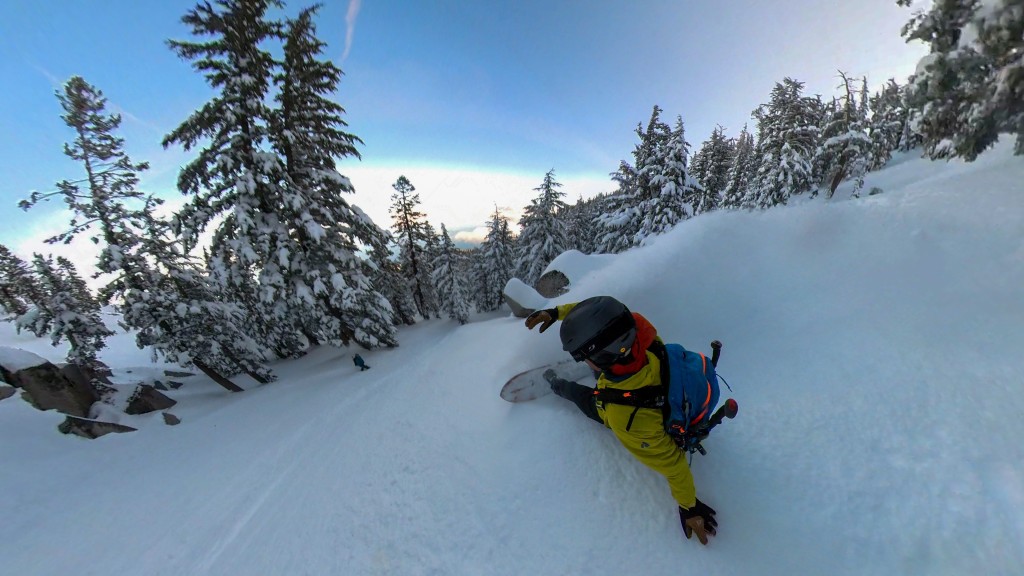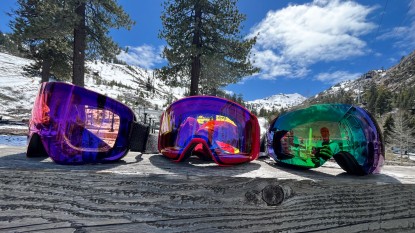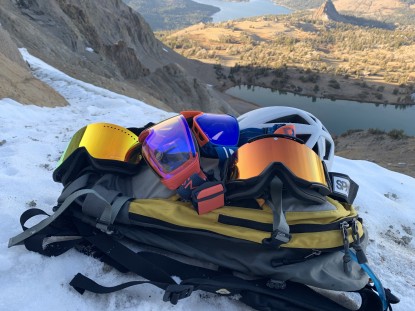Our Verdict
Compare to Similar Products
 This Product
Julbo Cyrius | |||||
|---|---|---|---|---|---|
| Awards | Best Photochromatic Goggle | Best Overall Ski Goggles | Best for Large Faces | Best Bang for Your Buck | Best on a Tight Budget |
| Price | $220.00 at Backcountry Compare at 3 sellers | $280.00 at Backcountry Compare at 5 sellers | $299.95 at Backcountry Compare at 4 sellers | $149 List | $72.00 at Evo Compare at 5 sellers |
Overall Score  |
|||||
| Star Rating | |||||
| Bottom Line | A comfortable everyday goggle with photochromic lens technology and great breathability | Top-tier optics, lens changeovers, style, and durability in a medium-fit goggle | This model knocks our socks off with great optics, user-friendly features, and an excellent fit for large faces | A budget-friendly photochromatic goggle that is sure to fit the needs of both beginner and advanced skiers and riders | This affordable goggle is great for any rider and any conditions |
| Rating Categories | Julbo Cyrius | Smith 4D Mag | Anon M4 Toric | Glade Adapt 2 | Smith Squad ChromaPop |
| Lens Quality (20%) | |||||
| Comfort (20%) | |||||
| Ventilation and Breathability (20%) | |||||
| Ease of Changing Lenses (15%) | |||||
| Durability (15%) | |||||
| Style (10%) | |||||
| Specs | Julbo Cyrius | Smith 4D Mag | Anon M4 Toric | Glade Adapt 2 | Smith Squad ChromaPop |
| Number of Included Lenses | 1 | 2 | 2 | 1 | 2 |
| Tested Lens | REACTIV 0-4 High Contrast | Chromapop Sun Red Mirror, Chromapop Storm | SONAR Red, SONAR Infared | Photochromatic Blue | Chromapop Sun, Yellow |
| Lens Shape | Cylindrical | Spherical | Toric. Frame is compatible with both Cylindrical and Toric lenses. | Cylindrical | Cylindrical |
| Frame Size | Medium | Medium | Large | Medium/Large | Medium/Large |
| Layers of Foam | Dual layer | Triple layer | Triple layer | Triple Density | 2-layer Dri-Wix |
| Ventilation | Air Flow | AirEvac | Full Preimeter Channel venting, Outlast Fog Management Face Fleece | Foam | Not specified |
Our Analysis and Test Results
The Julbo Cyrius is a photochromatic cylindrical goggle designed to maximize your field of view with a lens that adapts to the current conditions. Julbo's photochromatic lens options offer the widest range available on the market, and the Cyrius is available with seven different lens options. In addition to having the widest photochromatic range, photochromatic technology is built into the lens, ensuring longevity and eliminating temperature impacts. We have tested the Reactiv High Contrast 0-4 (5%-83%) and Reactiv Performance 1-3 (17-75%). The wide range, the extent of lens options, and optical clarity position this goggle as one of the best photochromatic goggles on the market.
Performance Comparison
Lens Quality
Most of our test goggles are equipped with interchangeable lenses that increase their versatility by allowing skiers and boarders to tailor their eyewear to light conditions. That versatility is wonderful, but the Cyrius utilizes a cylindrical photochromic lens that provides similar versatility through one single (double construction) lens.
We put the Cyrius to the test, wearing them in conditions from bluebird to blizzards resemblant of a snow globe. The Performance 1-3 lens provided solid optics for all but the brightest and darkest times. The High Contrast 0-4 was at home in all conditions, such as bright high altitude summits to whiteouts, one of the most challenging environments for goggle performance. The lens transitioned faster than other models we tested, taking about 25 seconds to fully transition from 0 to 3. The transition was not fast enough to change through patches of sun and shade while traveling at high speeds, but the lens can keep up with big-picture weather trends. A wide VLT range is essential to being a versatile lens, a distinct goal of the photochromatic category. We were highly impressed regarding the performance of the photochromatic lens technology as well as its ability to enhance color contrast and detail.
Both lenses provided impressive color accuracy with only a little rose color shift. Colors remained accurate and increased in vibrancy. When the lens tint is deactivated, colors are largely the same as the lens generally becomes clear. The 0-4 lenses provided some of the best contrast among our goggles, especially in low-light conditions. We could see the details on the snow surface quite well and easily make out obstacles. That said, similar to other photochromatic lenses, we found the detail on the snow surface was slightly reduced compared to high-end low light specific lenses.
The Cyrius is a frameless goggle that offers a large field of view, increasing peripheral vision. The excellent peripheral vision minimizes the amount of visible frame, similar to other models of this design.
Comfort
Even though goggle comfort can be subjective, some features make a comfortable fit more likely. Some basics include a frame with some give, medium fit, a wide and grippy strap, and some nice cushy foam. Most of our tested goggles, including the Cyrius, have these features.
The medium-sized frame of the Cyrius, which is already relatively flexible, also sports several slits on the upper half, providing an even greater degree of flexibility. This allows the goggle to flex and adapt to different sizes and shapes of faces. In addition to the pliable and comfortable frame, the Cyrius is also padded with a two-layer foam cushioning system that further helps mold the goggle to facial contours. Some of the other high-end goggles in our test include three-layer padding, but with the combination of a softer frame and the two layers, we didn't notice any remarkable difference between the two styles.
The strap on the Cyrius is a generous width equipped with three low-profile silicone beads that ensure everything stays in place. The strap also includes dual adjusters to make dialing in the proper fit even easier.
Ventilation and Breathability
The most comfortable and stylish goggles with the latest and greatest optics still need good ventilation to clear your field of view. After testing, we found the Cyrius to be one of our top performers in this regard.
Several features ensure adequate airflow through the Cyrius. The top of the goggle is a split frame design with a wide strip of air-permeable foam, which allows generous ventilation. In addition to the large ventilation area up top, the lower portion of the frame has two ventilation ports on each side. To further add to keeping your fancy photochromic lenses clear, Julbo also treats its lenses with an anti-fog coating on the lens. In the field and during our uphill testing, these goggles remained fog free. We had a slight condensation while walking uphill on a warm day, but this dissipated quickly.
If breathability is a major concern for you, whether it's frequent snow sliding on warm days, hiking in your goggles, or high-humidity environments, the Cyrius should be on your list. Moisture moved quickly and effectively thru the goggles, better than most of the test bunch.
Ease of Changing Lenses
The Cyrius is truly one lens for all conditions. We tested these goggles in just about every condition the mountains can provide, and we never had a reason to change the lens. It was a clear category 0 lens during night skiing, a lightly tinted category 1 lens during a blizzard, a category 3 lens during a bluebird day at a ski resort, and when we get to a high altitude peak, it'll be a category 4 deep red lens.
While you won't have to change this lens daily, it is still important to have a lens-changing system. The Cyrius uses a notch and groove type system to change out lenses. Our first attempt took us under five minutes. You'll only need to change the lens if damage occurs on the current one. The associated difficulty is similar to non-magnetic goggles in today's market.
Durability
We found that the Cyrius has a solid, lightweight feel right out of the box, and we expected our pair to stand up to testing. After putting our goggles through the paces, we can say they came out unscathed.
Our lens emerged without a scratch, even after being stuffed into our ski packs repeatedly. We did keep the goggles in the included stuff sack, which includes a semi-rigid support that mimics the lens shape — no need to send our test pair back to Julbo for replacement.
After two months of skiing in these goggles, the strap also looks A-OK. Assuming you take reasonable care of your gear, the Cyrius should easily provide several seasons of use. However, if you do run into any issues, Julbo has a limited lifetime guarantee for manufacturing defects in craftsmanship or materials.
Style
Eyewear style is tough to quantify, but the Cyrius has a nearly frameless design, which has proven popular over the past few years. That said, the design isn't over-the-top futuristic like some of the other options in our test lineup, and the Cyrius maintains a traditional shape. This might be a large advantage to many and an equally boring disadvantage to others. That said, the Cyrius was a common fan favorite in our test polls amongst different skiers and riders.
For skiers and boarders who want to match their eyewear to the rest of their kit, the Cyrius is available in several strap and lens color combinations. There should be something for everyone when it comes to color and style, and the Cyrius is a happy medium between traditional and modern aesthetics.
Should You Buy the Julbo Cyrius?
The Cyrius is our recommendation for a photochromatic goggle because of the lens quality — it's truly a one-lens wonder. If you're looking for one goggle to fit all conditions, this is one of the best available on the market.
What Other Ski Goggles Should You Consider?
If shelling out a couple of hundred bucks for a photochromatic goggle is not in the cards, then consider the Glade Adapt 2. Its wide range makes it a great versatile option for most conditions. And if you decide that photochromatic and frameless goggles just aren't for you, then consider the Shred Simplify+

















